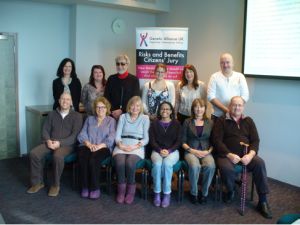On 13 February 2012, Genetic Alliance UK published a report of a Citizens Jury’s findings. The Citizens Jury was tasked with deciding on the balance of risk versus benefit of new medications for serious and rare diseases. We are hoping that this report will influence the regulators for those of us with rare, serious diseases, who struggle to find appropriate medications. The regulators often take a very cautious view about the risks of medications – however, many of us with serious conditions are prepared to take risks (as long as we are fully informed) if the benefits are that we can continue to live a good enough life.
This is something we, with Birdshot, already face. We know that our medication regimes can be toxic, but we make the fully informed decision to take medication in order to preserve our sight. That is our choice.
Rea was a member of the Citizens Jury – here she is with her fellow jurors.
More information on the Citizens Jury can be found at: http://www.geneticalliance.org.uk/latest-news.htm
Here are the findings of the Citizens Jury:
1. Regulators should include psychosocial factors in their decision making – Jurors would like to see regulators broadening the range of issues which they consider when deciding whether to approve a new medicine. Jurors have generated a list of 25 psychosocial factors that are important to them, to be included in the assessment of risks and benefits of new medicines.
2. Regulators should be more permissive for those treatments for people with rare and/or serious conditions-Because of their often unique circumstances, patients with rare and/or serious conditions may well be willing to take greater risks than the system currently allows. They should be given that choice.
3. Patients should be more involved in all stages of the process, from setting the research agenda, to post-marketing authorisation decisions – Patients’ experiences and preferences should be included at all stages. Patient representatives (such as patient group members) should be supported to be joint decision makers, alongside clinical experts, throughout the process.
4. Patients should be better supported to make their own decisions – Decision-making about new medicines is challenging, but possible for most patients provided they are given adequate information and support? (or something like that). Jurors generated a list of questions to help guide patients when deciding on their own treatment options.
